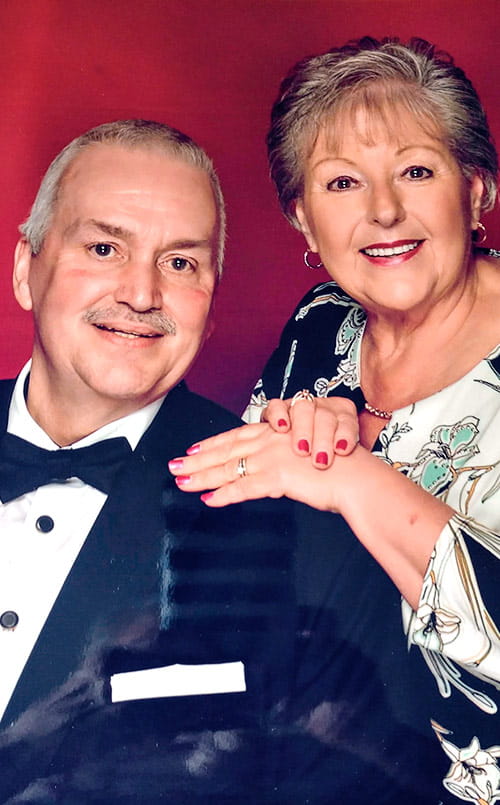Calling Out the CAR T Troops
November 21, 2022

UH creates innovative immunotherapy onsite to help patients’ own bodies fight cancer
Jack Boyle came to University Hospitals Seidman Cancer Center for a second opinion on an aggressive cancer attacking his body and discovered the army of fighters were within him.
Through a remarkable immunotherapy manufactured onsite to get treatment to patients faster, the Tallmadge man benefitted from CAR T-cell therapy, developed at the Wesley Center for Immunotherapy at UH Seidman Cancer Center. CAR (chimeric antigen receptor) T-cell therapy draws cells from the cancer patient and re-engineers them in the lab to recognize and attack cancer, then deploys these soldier cells back into the patient to annihilate the cancer. While most cancer centers that can offer CAR T must develop their cells offsite in commercial labs that take a month or more, UH Seidman Cancer Center can do this onsite in less than two weeks.
“It was like stepping into a different world when we came up to UH, and we knew this whole thing was bigger than us,” said Jack’s wife, Judi. “UH wanted us to know Jack's disease and understand his treatment options. We went from being told to not worry about this to coming up to UH and being involved in the process of the care and being informed about it. They gave us excellent treatment and care.”
Calling in the immune system’s soldiers
Molly Gallogly, MD, PhD, a hematologist and oncologist at UH Seidman Cancer Center, was the commander who oversaw Jack’s plan. CAR T has changed the face of cancer treatment.
With CAR T, the host cells are given new instructions to make a special receptor on the outside of their cells that serve as a homing signal to look for cancer cells, explains Dr. Gallogly. The receptors on the CAR T-cells bind to the surface proteins on the outside of cancer cells.
“By binding to its target, then the receptor can call for help, bringing in the immune cells to attack the cancer cells,” Dr. Gallogly said. “The engineered receptor has all these abilities – to recognize, signal and destroy the cancer. Because the T-cells keep reproducing, they can persist for a long time.
“CAR T is a living treatment.”
Attacking an aggressive cancer
Two weeks after his retirement in 2018, Jack went for his Medicare check-up. He opted for the optional body scan, just to be sure. The test found carotid blockage and an incidental finding of a mass in the left side of his neck, plus many pronounced lymph nodes. While another hospital told him it was cancerous, they assured him it was not aggressive.
Jack came to UH Seidman Cancer Center, where he was diagnosed with grade 3B follicular B cell lymphoma, an aggressive subtype of non-Hodgkin lymphoma. From his first appointment, he had testing and appointments lined up quickly and a thorough plan of care was established. He went to UH Sharon Center in Wadsworth for chemotherapy. After a few different rounds of chemotherapy and a stem cell transplant in 2021, the cancer returned in early 2022. CAR T was Jack’s best option at this point, when other treatments including transplant had failed to stop the cancer.
A durable remission

“CAR T is especially attractive in patients who have relapsed after a transplant,” Dr. Gallogly said. “We have more options than we’ve ever had, especially for patients who have had multiple relapses. It has a track record of getting patients into a durable remission.”
For CAR T, the patient’s blood is removed over the course of a couple hours by an apheresis machine in the outpatient Stem Cell Transplant Unit at UH Seidman Cancer Center. The machine separates out the immune cells that will be altered in the lab. The cells are then taken to the lab in the Wesley Center for Immunotherapy and the CAR T-cells are manufactured. After the manufacturing process, the patient is admitted to UH Seidman Cancer Center to receive their CAR T treatment.
While CAR T has primarily been used for cancers like lymphomas, there are now clinical trials examining its possibilities for solid tumors, Dr. Gallogly said.
“There’s an attitude at University Hospitals that this CAR T-cell treatment is like a miracle, and it was a relief to be eligible for this option,” Jack said. “I don’t have any regrets about my life, and it is worth trying. Cancer treatments are growing by leaps and bounds.
“We’re moving forward with UH.”
The Wesley Center for Immunotherapy at UH Seidman Cancer Center was recently expanded through a generous $10 million donation from Kimberly and Joseph Wesley. The onsite development of CAR T, natural killer (NK) cells and other cell-based therapies enables patients to have access to the latest therapies more quickly. UH is one of fewer than a dozen academic medical centers to have successfully manufactured CAR T-cells for human use, and is the cornerstone of the nation’s only National Center for Regenerative Medicine.
Related Links
Learn more at UHhospitals.org/Immunotherapy


